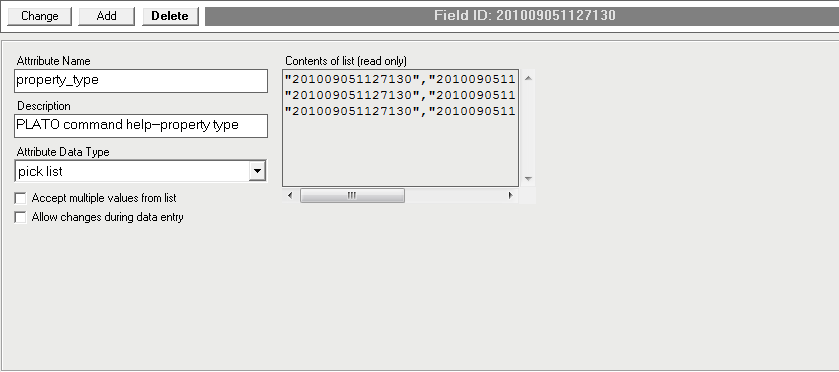|
|
Plato Screens: Overview |
|
| Database Screens |
|
Database, Concordance (Main View) |
|
Database, Concordance (Profiles) |
|
Database, Concordance (Settings) |
|
Database, Concordance (Statistics) |
|
Database, Cross Reference Display (Main) |
|
Database, Cross Reference Display (Maps) |
|
Database, Cross Reference Edit (Assigning Cross References) |
|
Database, Cross Reference Edit (Change Object Class) |
|
Database, Cross Reference Edit (Clear Cross References) |
|
Database, Cross Reference Edit (Copy/move to Database) |
|
Database, Cross Reference Edit (Copy/move to Folder) |
|
Database, Bookmark Pane |
|
Database, Clusters, Display |
|
Database, Clusters, Edit |
|
Database, Clusters, Notes |
|
Database, Export Pane |
|
Database, Graphics Pane |
|
Database, Lookup Pane (Bookmarks) |
|
Database, Lookup Pane (Cross References) |
|
Database, Lookup Pane (Folders) |
|
Database, Lookup Pane (Hyperlinks) |
|
Database, Lookup Pane (Lists) |
|
Database, Lookup Pane (Note Search) |
|
Database, Lookup Pane (Object Word Profile) |
|
Database, Lookup Pane (Parent Folders) |
|
Database, Lookup Pane (Validation Lists) |
|
Database, Lookup Pane (Words in Concordance) |
|
Database, Lookup Pane (Words in Object) |
|
Database, Main Screen |
|
Database, Maintenance Pane |
|
Database, Properties, Backups |
|
Database, Properties, Description |
|
Database, Properties, Display |
|
Database, Properties, General Stats |
|
Database, Properties, Inheritance |
|
Database, Properties, Memory Stats |
|
Database, Properties, Object Attribute Stats |
|
Database, Properties, Object Class Stats |
|
Database, Properties, Omit Lists |
|
Database, Properties, Validation |
|
Database, Scripts Pane |
|
Database, View Pane (Categories, Multi-dimensional) |
|
Database, View Pane (Categories, Single Hierarchies) |
|
Database, View Pane (Cross Reference Hierarchies) |
|
Database, View Pane (Folders and Other Views) |
|
Database, View Pane (Subdirectories and Files) |
|
Database, Script Pane (Find and Replace) |
|
Database, Script Pane (Markup Templates) |
|
Database, Script Pane (Messages) |
|
Database, Script Pane (Script Name, Type) |
|
Database, Script Pane (Script Output) |
|
Database, Script Pane (Script Scope) |
|
| System Configuration Screens |
|
System Configuration (Colors) |
|
System Configuration (Default Lists) |
|
System Configuration (Display Templates) |
|
System Configuration (Editors) |
|
System Configuration (Elements) |
|
System Configuration (File Templates) |
|
System Configuration (Messages) |
|
System Configuration (Paths) |
|
System Configuration (Report Templates) |
|
System Configuration (Signatures) |
|
System Configuration (User Variables) |
|
| Class Library Screens |
|
Class Library, Categories |
|
Class Library, Change Impact |
|
Class Library, Class Attributes |
|
Class Library, Main Screen |
|
Class Library, Markup |
|
Class Library, Markup Editor, Autoenumerators |
|
Class Library, Markup Editor, Export Class Library |
|
Class Library, Markup Editor, Export Database |
|
Class Library, Markup Editor, Object Import |
|
Class Library, Markup Editor, Xref Maps |
|
Class Library, Markup Editor, Tags |
|
Class Library, Object Classes |
|
Class Library, Settings |
|
Class Library, Transfer |
|
|

|
|
|
| Screen Description |
|
Screen elements |
|
This pane displays fields for configuring a object class attribute. |
| How do I get here
|
|
|
|
|
name |
type |
action |
| Attribute Data Type |
text field |
property |
|
| Data type defines the action of the field and its special attributes. Plato allows 12 user assignable data types. |
|
| Attribute Description |
text field |
property |
|
A longer description of the attribute. Since this a sortable field, it can be used to globally categorize attributes, or simply to provide an expanded description of the attribute if the attribute name itself might seem ambiguous when compared to all the other attribute names.
|
|
| Attribute Name |
text field |
property |
|
| A short, descriptive name for the attribute that quickly identify it. Good examples would be "author," "title," "publisher," and the like. This is a mandatory field. Note that any space characters in your name will automatically be converted to underscore characters by Plato. |
|
| Special Attributes |
text field |
property |
|
| Each attribute has 'special attributes' that depend on the data type. The 'text' data type, for instance, has the special attribute 'case'. |
|
| |
| |
|
|
|
